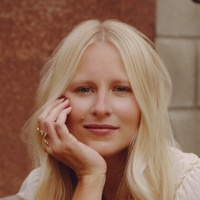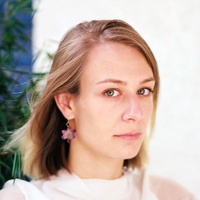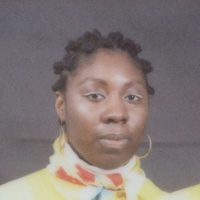As told to Jess Focht, 2922 words.
Tags: Writing, Beginnings, Process, Failure, Success, Money.
On finding ways to keep going
Writer Coco Mellors discusses the path she took to becoming a writer, dealing with rejection, and learning to work through discomfort.How or when did you realize you’d become a writer and did you always want to be a novelist?
I always wanted to be a writer. We had what was a word processor in our house. I would write poems on it when I was younger and then print them out. I had them in a little stack and would do poetry readings to my parents. I always was really interested in writing. And, of course, in reading—I think all writing stems for reading. I feel like writing is the river and reading is the sea, and everything leads back to that. But I didn’t know how to be a writer, or what that meant, or how to make a living.
What’d you study in college?
I studied writing in college. I took creative writing workshops and was mostly writing short stories, but I always felt called to novel writing. I fell in love with novels at such a young age, and that’s what got me interested in reading. I love short stories, but for me novel writing felt like the highest form that I could reach as a writer. When I graduated from college, I took a job full-time as a fashion copywriter. And in my early twenties, all I did was write copy. I didn’t really write my own stuff. I felt very, very lost, creatively. I had a boyfriend who was an architect and was incredibly directed and had such a clear vision of what he wanted to make in the world. And I just felt really adrift, to be honest.
Then I started taking these evening writing classes when I was 24, and I would submit short stories to them. I used those stories to then submit and apply to an MFA program—and I got in. Then when I started the MFA, that’s when I really started to think, “Okay, I’ve been given two years to focus, to be trained. Let’s use this time to start a novel.” But I had no idea what my novel was going to be. I just wrote scenes. And then I started to work with the same characters and it very organically grew, like mold, into a novel. It just spread.
I’ve read that it’s taken you a lot of time to write Cleopatra and Frankenstein. I think that’s such an important thing—even just as a reminder for a lot of creative people, especially writers. Some people think of like novel writing as like, “Okay, I’ll do it in a year and then it’ll be published.” And it’s typically a much longer process.
I’ve also read about how your novel was rejected by countless publishers, and now obviously it’s a best seller and really has blown up and found a huge readership. That’s a good reminder of rejection and being persistent with your work. How did you know it was finished? And then how did you keep faith in the project when you were facing rejection?
Really, publishing is just this amazing exercise in patience. Every single stage takes longer than I think it’s going to take.
With the first novel, I thought it was done, but it wasn’t done. So the version that I sent out to publisher wasn’t in its final form yet, but it was as far as I could take it at that point in my life. And I had been working on it by then for almost five years.
It wasn’t tight yet, plot-wise. That was the feedback I got over and over again from these editors. And it was extremely disheartening, but not hopeless as an experience because I knew I wasn’t delusional, which is the big fear of a writer, because every editor said they loved it. Every single one said the structure wasn’t working and that plot-wise, it needed to be more propulsive. I think it takes a lot of work to get a novel as kind of big and sweeping as this one is into shape. But luckily there were two editors who were willing to read it again, and that changed my life. So they gave me direction, and they told me what they thought I needed to do in another draft. And then I went and did it and they both ended up buying it.
It took months and I was feeling so full of hope and then would send this fragile, incredibly vulnerable, precious part of myself out into the world. But I wasn’t getting rejections like “This is shit, stop writing.” I was getting rejections that were incredibly thoughtful and kind and really encouraging. So even though it wasn’t the answer I wanted, I always felt like there was still hope—and that something was working, clearly—it’s just not quite working enough. I think being ignored is probably the hardest thing as a writer–sending a work out and not even getting responses. I find that really, really brutal, to be honest. So actually, the rejections, with tough as they were, at least I felt like I was getting feedback.
That’s great advice, too: Persistence and how if you have faith in a project. You do as much as you can with it, then hopefully it’ll find the right place and the right publishing house and the right editor and all of that. It seems like you did.
In the novel, Cleo is working to be like a full-time artist, which is something that many are trying to navigate these days. How did you figure out how to make the living through your creative work?
Such a big part of being a writer, I’ve found, is navigating the writing that will make you money and the writing that you love to do. And they are not always the same thing. And we’re all striving for the point in life where they are. But for me and my first book, I didn’t have an agent, I didn’t have a publisher. I wrote it for years, just trying to finish it in order to get those things.
So I copywrote during the day and would write fiction in the evenings and on my weekends. And then I also, at that point, was freelance. So I would work sometimes three or four days a week. And that meant that I would have a Friday to write or a random Tuesday to write.
I would set myself these small goals to keep me going. I would think, “Okay, I’m going to hand in this chapter to this group of people. And then I’ll give myself a weekend off and I don’t have to go to the library for the whole weekend.” But I have to say that for years, I spent most of my weekends at a library, which perhaps doesn’t sound like the most fun, but it’s just because I had a full time day job. So I had to do it. I’m always trying to work out the balance between earning enough money to live the kind of lifestyle I want, giving myself enough free time to write, giving myself downtime, giving myself time with my partner, who I love. It’s not easy, it’s really hard for all of us.
I used to think, “god, I wish I was paid to do the thing I love. I wish either I loved copywriting so much I didn’t want to write fiction, or I write fiction and I got paid to do it.”
And one thing I would say, though, is that I actually found that if I have nine things to do in a day, I’ll probably get eight done. If I have one thing to do in a day, I will not get it done. So sometimes with writing, too much free time doesn’t help me. I did have a month off over last summer. I didn’t copywrite at all. I didn’t make any more progress with my book than I usually do. I don’t know what happened to that time. It was like air, it just escaped the room.
There’s something about having too much free time. I feel like we, as creatives and artists, are like, “Oh, it would just be so ideal if I had stacks of cash and could just do anything.” But I also feel like it seems like there’s a balance, you know what I mean? Like of maybe not fully overworking yourself. But once the like gears are turning in some way, it’ll fulfill other parts of your life. It seems like that happened with you.
Yeah, I think so. I felt like the unconscious mind was always working on my book. So things were being muddled through even when I wasn’t working on it. And I did find that copywriting taught me discipline, deadlines. I mean, most of the time the client always wants the copy shorter. So it really teaches you how to edit and how to get to the point. And then there are some things about copywriting that are kind of harmful to fiction, which is that copywriting is very neat, you know? And it can be very pat and slightly punny and a little cutesy, you know, it depends on the brand you’re working with, but those are the things. It’s very alliterative, often, and those are some habits I find seeping into my fiction that I have to wean back out because of that neatness.
Fiction should be that amorphous place in between where questions don’t have to be on answered always immediately.
You talked about going to the library and really focusing on getting work done there. I’m sure now maybe it’s a little different, or maybe you still hang out a lot in the library—but what’s your writing process like and is there like a specific routine incorporated in it?
It’s always been very amorphous. I fit it in when I can do it at the moment. I have more time to write, but I wake up, I go to yoga. I’m in recovery, so I’ll go to a twelve-step meeting. I’ll have a little matcha, and then I’ll settle down to write mid-morning. And my husband is up, has gone for a run, and by 8:00 AM is at his desk, ready to work. And I am just not like that. I just have a kind of looseness to it. I try to make it feel like play to a certain degree. I listen to music a lot, and I listen to the same song on repeat for specific chapters.
I’ll play a song and walk around. I take what’s called imagination walks. I walk around my neighborhood, I only listen to music, and I just imagine the scene that’s coming next. And so by the time I actually sit down to write, I hopefully feel pretty full of the scene. I feel full of whatever emotion it is that I want to convey.
With my novel, a lot of the time, no one’s paying me to write it. No one’s waiting for it, at least with the first book. I have to enjoy the process because I only have the process. There is nothing else but the process of writing. The publishing aspect is like 5% of the whole experience, 95% is just you being with yourself and words. So I try to make it feel playful. And I love that feeling of sinking back into my mind, you know? No one’s around, I get to just go back to imagining. It’s the best feeling.
How important is the process of reading while you’re writing fiction? I think that writers are readers first. And I don’t know if that’s your relationship with reading, but how important is reading to you, and do you read a lot of books while you’re writing fiction?
I probably read a book a week. I’m always reading something. I’m never not in another novel. I can’t even imagine what I would do before I go to sleep if I wasn’t reading something.
I only really read literary fiction. I don’t really read any commercial fiction. I read very little nonfiction. I pretty much exclusively read for language. And if I’m reading a book that has a fresh and original take on language, it just makes me want to write better. If I’m reading a book where I feel like the language is in any way loose or not as thoughtful, I feel like it’s almost a bad influence on me and it gives me bad habits. So I try to put it down. But I mostly read just phenomenal fiction. There are so many good contemporary writers. Most of the time I read something and I’m pretty amazed by how good it is.
What’s your relationship like with social media, or any other online forums/distractions?
I’ve had Instagram for a long time, and I used to really enjoy making stories. I no longer really do it because it’s just too time-consuming and I don’t have the verbal bandwidth. I spend so much time in language every day that I now no longer can. Bookstagram has been an incredibly welcoming community to Cleopatra and Frankenstein, which was never a given. You never know which books are going to take off and which books aren’t.
I love hearing from readers, but I’m also hearing from a very specific demographic of reader, which is mostly younger women. So I always try to remember that they’re not representative of every reader, but they are representative of a specific type of reader who I adore—who are young women excited about books. It’s gorgeous to hear from them, so I try to comment and reply to everyone. Because I think it would’ve meant a lot to me when I was younger to hear from an author, especially an author who’s not that much older than me. Someone who’s attainable in their career, who you could look to and think, “I could do what that person is doing.”
That makes sense. You said you have more time with writing now than you did before. Do you have to limit your distractions? I think being a person in this day and age is just kind of balancing distractions—especially for people who are creative. How do you find that balance?
When I write, I turn my phone off, I put it in a drawer in another room, and I keep my wifi off for the most part. And I really, really try, even if I’m desperate to look something up, I’ll make a note of it and I’ll go back to it. And at the hour break, sometimes I’ll turn on my wifi and look at something. But I find that if I turn my wifi on to go research something, I’m on my email before I even notice it. It’s like it’s not conscious, I haven’t meant to, and then I’m just down a rabbit hole. So really, I have to be pretty vigilant about it.
When I worked in the library, I had a locker specifically just to put my phone in. And I never connected to the library wifi. I just never got the password for it. When you’re writing, it’s so easy to tap out when you’re stuck. It’s so easy to reach for your phone. And my teacher, Nathan Englander used to say, “It’s the 27th second that the thought crystallizes or that the image becomes clear. And so you have to wait through one through 26 to get to 27”. Obviously, that’s a symbolic number. But if when you get to 23, you’re stuck and you’re just like, oh, fuck it, and you pick up your phone, you go back down to zero.
You have to be able to sit through the discomfort. And it’s really, really hard.
Yeah. And I do feel like, especially with writing, it’s nice that social media can help you build connections and maybe help publish and promote your writing. But also, you have to take a step back and put your phone in a drawer and be without it. And it’s almost essential for writers to be without it—especially as it becomes more incorporated in our society.
What advice would you give writers today?
Two pieces of advice I was given that were really helpful is my teacher, Rick Moody, said, “Don’t be afraid to entertain.” And I think sometimes with literary fiction, there’s almost a fear of being dramatic or cliched, but actually, you do have to entertain your reader.
So I put that on a post-it note above my desk. You’re competing with television, podcasts, just social media. It’s hard to break through. Are you writing something that really engages and grabs someone and makes them want to read on? Which doesn’t mean that everything has to be like wham, bam, fireworks, but sometimes I would notice that my attention would drift in my own work and I was like, “Oh, it’s fine. It’s fine. They’ll keep reading.” They won’t. So that’s something I’ve learned.
Coco Mellors Recommends:
Watch: Everything Everywhere All At Once
See: Imogen Cunningham retrospective at The Getty
Read: Beasts of a Little Land by Juhea Kim
Take: Asystem De-Stress Gummies
Listen: Dance Fever by Florence + The Machine




